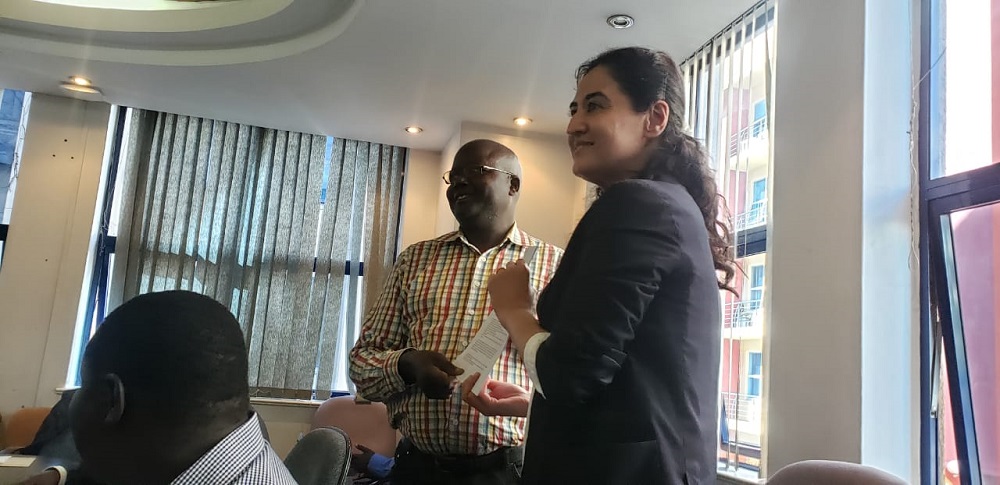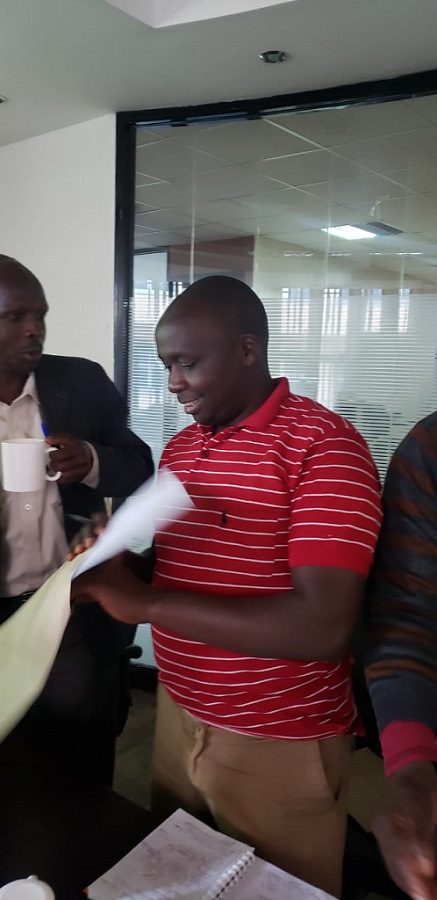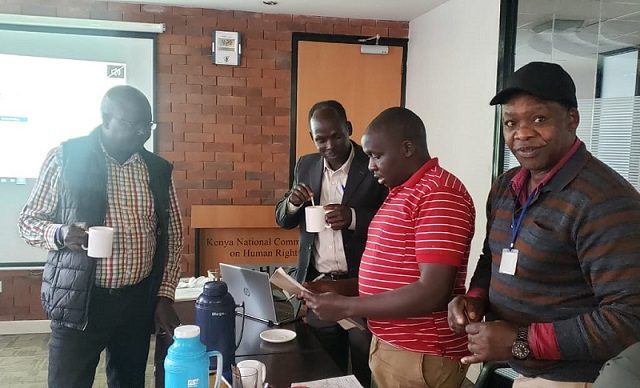We met members of Civil Society Organizations (CSOs) in Nairobi to discuss Freedom of Religion or Belief.
The issues under discussion varied from the progressive Constitution of Kenya 2010 with a generous Bill of Rights to the recognition of indigenous peoples in Kenya.
The Constitution of Kenya has articles to protect Indigenous Peoples (IPs) as well as provisions to ensure indigenous peoples gain access to essential services as well as employment.
Despite having good laws on paper, in practice indigenous peoples are still struggling with issues such as inadequate presentation at the legislatures.
There have been attempts by political parties to include marginalized communities.
Indigenous peoples are connected to their lands and their spirituality is based on land. The National Land Commission (NLC) are responsible for addressing historical land injustices.
A number of reports have been authored to address some of these land rights such as Ndung’u report. This report focused on irregular allocation of public lands in Kenya.
Efforts have been made to ensure indigenous peoples enjoy their rights including their Freedom to Religion or Belief. For instance, the Ogiek are still struggling and have not been settled despite land having been set aside for that purpose.
The Ogiek were not able to practice their culture and religion because of their expulsion from their ancestral lands.
The Task force report on the implementation of the Ogiek case has not been made public.
For the Endorois Case, the community was not represented in the task-force. The state has also accessed the members of Endorois community for failing to fully participate in the Task force activities.
On the right to freedom of religion, the community wanted to have access to Lake Bogoria in order to access their sacred sites with the national reserve.
According to some people, the community is not denied access to the Lake Bogoria national reserve. If they make plans they can easily access it and practice their right to religion. However, the elders we spoke with at Loboi have a contrary opinion on this matter.
The community said that they are denied access to Lake Bogoria and sometimes no reasons are provided. Or flimsy reasons such as when they enter the forest to access sacred sites, they scare away wild animals using their dogs.
According to the local community, when there is a problem, the KWS only allows specific family to offer prayers which according to the elders is not adequate become they make communal prayers.
Kenya National Commission on Human Rights is widely involved un protecting indigenous rights in Kenya. The agency has been involved in cases such as Embobut, Mau and Chuka in Tharaka Nithi County.
Elders were seeking to have access to the deep part of Mt. Kenya. They were seeking to access the deep part of the forest where they had their sacred sites. They went to court but did not get a favorable verdict.
They lost the court case due to technicalities. The case had overstayed and those who had filed the case were not taking any actions.
The senior researchers on Freedom of Religion or Belief heard from the Nubians of Kibera too. This community also had their own shrines as well as engaged in elaborate ceremonies such as burials.
The Nubian elders who spoke mentioned that having come from Sudan, they would not comfortably fit in with the local communities. For over 50 years, they would have no access to water, education and electricity.
With the bulging population, there is stiff competition, the Nubians worked for the colonial government in the military. At the end of the colonial rule, the Kenyan government did not absorb them into the military. They had to find ways of surviving.
In terms of intersectionality, women from indigenous communities face additional challenges because they are not economically liberated. Further, they also take up more roles such as childcare, house chores and fetching water from the springs.
In African traditional societies, communities had their own various forms of worship of their gods, for instance -the Kikuyu would pray pray facing mount Kenya, communities had designated shrines (such as certain trees, forests, caves and in some cases animals set apart for worship and sacrifices, ritual ceremonies). There were highly organized and respected rules that governed the manner and form of worship.
For indigenous People in Africa the spiritual beliefs and practices comprise their culture and way of life. Indigenous people are so connected to their lands that occupation and access to their lands are imperative for their rights to culture and religion.

The African Charter on Human and Peoples Rights appreciates the communal nature of rights and freedoms including the freedom of religion or belief.
Article 8 of the Constitution of Kenya 2010 provides that ‘there shall be no state religion.’ This has been interpreted to mean that no religion shall have prevalence over the other. This makes it possible for citizens to enjoy their Freedom of Religion or Belief.

Article 44 of the Constitution of Kenya guarantees every person including indigenous peoples the right to use language and participate in cultural life of their choice.
International law is also applicable in Kenya by virtue of Article 2(5) and (6) of the Constitution of Kenya 2010 which incorporates into Kenya law the general rules of international law. Hence, article 18 of International Convention on Civil and Political Rights (ICCPR) provides that everyone shall have the right to freedom of thought, conscience and religion. This right includes the right to adopt a religion or belief of his choice, and freedom …to manifest his religion or belief in worship, observance, practice and teaching.
Kenya’s indigenous peoples are facing a number of challenges when it comes to enjoying their Freedom of Religion or Belief. This includes: lack of secure land tenure, forced evictions, lack of dedicated legislation on indigenous people and state-centric approaches to conservation.
GOT a story? RING Kerosi Dotcom on EMAIL info@kerosi.com


